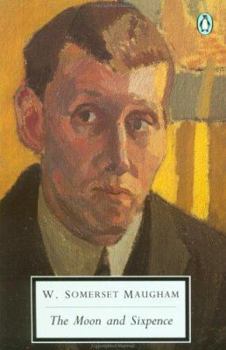The Moon and Sixpence
Select Format
Select Condition 
Book Overview
An uncompromising and self-destructive young man deserts his wife, family, business, and civilization for his art. Shedding harsh light on an artist's ego, Maugham reveals the lengths to which one man will go to focus on his art. Written in 1919, this unforgettable story is timeless in its appeal.
Format:Paperback
Language:English
ISBN:0140185976
ISBN13:9780140185973
Release Date:January 1993
Publisher:Penguin Group
Length:217 Pages
Weight:0.39 lbs.
Dimensions:0.4" x 5.1" x 7.9"
Customer Reviews
4 ratings
Passion, Passion, Passion.
Published by Thriftbooks.com User , 17 years ago
I always chafe when I hear people downplay the talent and importance of Somerset Maugham. He happens to be one of my favorite writers and The Moon and Sixpence is by far--in my opinion--his best book. I reread it yesterday and continue to be moved by its emotion. No other novel describes the passion which motivates the artist in such intricate detail. With Strickland, our neo-Gauguin, we see that the force that drives is absolute even though it may not be noble or life-affirming. As a man, Strickland treats people the way most of us treat parking places--we enter them, leave them and then never give their existence a second thought; yet, the one thing he undoubtedly has is artistic integrity. The middle third of the book is the strongest and here, as elsewhere, Mr. Maugham tells an amazing story. Also of note, are his impressions of women which may be as sound as those of anybody else I have ever encountered. Overall, this is a vastly underrated novelist and a vastly underrated book.
"what do you think of me?" - reply : "i don't think of you at all!"
Published by Thriftbooks.com User , 19 years ago
so goes the personality of charles strickland, the hero of "moon and sixpence". based loosely on the life of the great french painter paul gaguin, the story is of an english banker who suddenly abandons his middle class existence in england and moves to paris to paint. fired by his passion for his art, he's so absorbed in it at the cost of being indifferent (often misinterpreted as ruthless) to everything else - even his own well being. such is the personality of creativity (often at odds with normal perceptions of morality, ethics etc) and maugham in his own classic way (loaded with keen psychological insights) brings out the complexities of such a character and the effect it has on those who come into contact with him. it is a one-of-a-kind book. get it! a more mellow though adorable telling of a similar tale can be found in a.j.cronin's 'a thing of beauty' aka 'crusader's tomb'. that's a fantastic read too.
Made time to read this classic
Published by Thriftbooks.com User , 22 years ago
There are many good books out there and none of us have time to read them all. Here is one that you should make the time to read. For much labor, thought, and (dare I say it) love went into the writing of this classic biography of the artistic genius, stockbroker turned painter, Paul Gauguin. Much love, and some imagination, and a ton of research including visits to the haunts of the man himself -- Paris and Tahiti and Taravao, the home of Ata, Paul's woman in the islands. Add to this the sympathetic outlook of a humanist and the craftsmanship of a great novelist and you get one of the great books of our time and probably of all time. This is a book written by a genius about a genius who made pictures that were and are still stupendous and overwhelming. Charles Strickland's (Gauguin's alter ego and the protagonist of this story) last picture, the Polynesian garden of the Hesperides, with its quivering purple and red lusters that suggested the palpitation of something mysterious and terrible with the possibilities of the Unknown, possessed a somber passion previously unknown in the history of art. It was his best and most complete work, done a year after the artist had gone blind from leprosy. By his command it was burned soon after his death. When you visit Taravao, you will see a replica which still has tremendous power. After you read this book, you will understand that power and you will have an appreciation for Gauguin's art that you never had before. You will have an appreciation for beauty and truth that succinctly demonstrates the redemptive quality of great art.
Haunting, thoughtful novel.
Published by Thriftbooks.com User , 24 years ago
It has been noted many times that artists are usually not the most pleasant human beings to be around; Maugham's novel is, among other things, a compelling examination of why this is so. The obsessed artist who dominates this book, Charles Strickland (based on the notorious Paul Gauguin), walks away from his cushy middle-class existence in England to pursue his dream to paint, amid frightful poverty, in France. Strickland is an unforgettable character, an inarticulate, brutishly sensual creature, callously indifferent to his fellow man and even his own health, who lives only to record his private visions on canvas.It would be a mistake to read this novel as an inspiring tale of the triumph of the spirit. Strickland is an appalling human being--but the world itself, Maugham seems to say, is a cruel, forbidding place. The author toys with the (strongly Nietzschean) idea that men like Charles Strickland may somehow be closer to the mad pulse of life, and cannot therefore be dismissed as mere egotists. The moralists among us, the book suggests, are simply shrinking violets if not outright hypocrites. It is not a very cheery conception of humanity (and arguably not an accurate one), but the questions Maugham raises are fascinating. Aside from that, he's a wonderful storyteller. This book is a real page turner.






